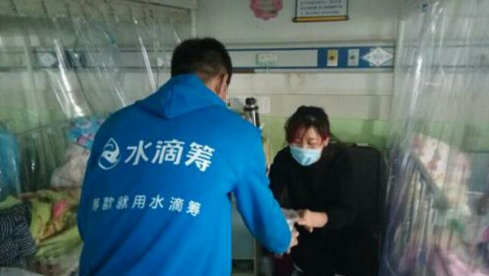It has been discussed in local media that China's health care crowdfunding and online insurance sales site, Waterdrop, Shuidichou in Chinese, is planning an initial public offering in the U.S. market as early as the first quarter of 2021, targeted at raising nearly $500 million. Goldman Sachs and Bank of America would be the book-runners.
The company said it had no comment.
While Waterdrop has achieved a high level of financial success, the platform's claims to alleviate high medical fees faced by patients, in particular those with critical illnesses, have come under scrutiny.
Largest Funding Round
Waterdrop operates medical crowdfunding platforms Shuidichou and Shudi Huzhu, as well as the commercial insurance brokerage platform Waterdrop Insurance Mall.
The startup, now in its fourth year, claimed to have crowdfunded nearly 32 billion yuan ($4.8 billion), as of July, for patients across China with severe medical conditions like cancer and leukemia. Meanwhile, it claimed to have distributed 150 million yuan in subsidies to its crowdfund users since its establishment.
Business Times reported Aug. 21 that the company has raised $200 million in its funding, with the injection led by the insurance giant Swiss Re-Insurance. Previous investment backers Tencent Holdings, IDG Capital and Wisdom Choice Global Fund also participated in the investment. It was viewed as the largest financing amount this year in the global insurance tech market.
Before the D-round funding, the company had already attracted 1.8 billion yuan in financing, with 1 billion yuan in C-round funding in May.
Waterdrop was listed this September among the top 10 most valuable digital health companies across the globe in 2020, according to market intelligence platform CB Insights.
The company was expected to go public with a valuation between $4 billion and $6 billion at the end of 2020 or the beginning of 2021, according to a Bloomberg News report.
Waterdrop responded it had no plan for an initial public offering but would explore a variety of possibilities in the capital market.
Controversial Business Model
As of this September, Waterdrop Insurance Mall has seen more than 18.4 billion yuan of annualized premium with 140 million users. 76% of them are from third- or lower-tier cities, according to the company's website.
Founder Shen Peng said in April and May the company made positive net income.
Domestic news media has questioned on several occasions its business model, which relies on selling insurance and "unprofessional crowdfunding."
Shuidi huzhu, whose claim to only charge users 0.01 yuan to use the crowdfunding platform, was exposed as a trick to gain new customers. Instead, users have to pay money to add credit or will be induced to purchase insurance via Waterdrop Insurance Mall platform.
"Black Cat Complaint," a public platform voicing consumers' complaints, listed cases of elder consumers being tricked by Waterdrop. Initial 1 yuan premium offers ended up costing 1000 yuan per year.
The population over 50-years-old is the largest uninsured community in China, according to TaiPing Insurance. This is also the main user group targeted by Waterdrop's crowdfunding business.
An investigative video produced by Pear Video shot in December showed "Waterdrop Volunteers" in 40 cities across China were signing up patients to fill quotas by exaggerating their stories and failing to check financial details. The "volunteers" said they could make 80 to 150 yuan after uploading one crowdfunding case on the platform.
After the scandal was exposed, Shen apologized and claimed the company would investigate the team's service.
Sources told Business Times that Shanghai Cancer Hospital, a renowned hospital where patients come from all the regions in China to seek cancer treatment, still see Waterdrop "volunteers" promoting services to patients.
Where Does The Money Go?
A "Waterdrop Volunteer" confessed in the video that the "business" was exploiting people's care for others, and the actual crowdfunding amount for each case has been decreasing. Additionally, the platform fails to reveal how the crowdfund money is spent.
As of the end of July, Waterdrop subsidiary company Baoduoduo Insurance Broker was fined 760,000 yuan for deceiving issuers and policyholders alike as well as concealing contractual details.
China Banking and Insurance Regulatory Commission said Sept. 8 that online insurance platforms - including Shuidi Huzhu - have large memberships but operate without legal licenses. There is a possibility the platforms "run off" with prepaid premium so the financial and social risks "cannot be ignored," said the top regulator.
In a recent response to public criticism and unsubstantiated rumors attacking the company, Waterdrop said it is not a charitable organization but claims it has never charged fees to users. It has forged a capital management agreement with Pingan Bank so the funds can be separated from the platform operation, said the company.





